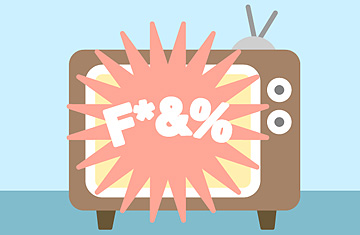
(3 of 4)
"My take on him was that he was a little like my dad who used to listen to Rush Limbaugh a lot to make himself mad," says Adam Samaha, an NYU law professor who has written about the Carlin case. "Not because he agreed with the message. He liked getting worked up, and I think for Douglas, it was something similar. He thought of himself as the culture police. He was out there looking for problems and outrages. That's why he told me he was listening to WBAI constantly."
But Douglas denies this. He says he was merely offended that his son, who was 15 at the time, would be able to hear such words on the radio in the middle of the afternoon.
"I wasn't looking to agitate," says Douglas. "Some of the far-out media have constantly said, 'Well, Douglas was looking for a reason to complain.' That's nonsense. Obviously, he's heard those words before, but the question is, again, just because you've heard them, does that give you permission to articulate them?"
By the time the Supreme Court sided with Douglas five years later, WBAI was in freefall.
"When the war ended, the war protesters went to law school and got families and mortgages and stopped listening to and contributing to WBAI," says Josephson.
He says the Carlin case didn't have any effect on WBAI's listenership, but looking back on it, he says he wishes the radio station — still on the air in New York City — never would've aired the monologue.
"We were warned by our attorneys that we might lose," he says. "What we got was a firm decision of the FCC's power to regulate so-called indecent content. Today, I would've said 'Don't.' Better leave it ambiguous than have a firm ruling. But at the time, I was all for it."
A Laissez-Faire Approach
While the government prevailed in Pacifica, indecent material and censorship was essentially a non-issue through the '70s and into the '80s. In fact, the FCC brought no enforcement action against indecent broadcast material between 1978 and 1987.
"The FCC knew it could sanction a broadcast like the Carlin monologue, but it wasn't completely clear what else they might be able to do," says Samaha. "So we ended up continuing a tradition where the FCC at certain points was quite restrained in its enforcement policy."
Under President Ronald Reagan, FCC action largely followed his laissez-faire thoughts on government and the economy, where crossing the line meant doing roughly what WBAI did. Anything less than that wasn't going to get any attention.
But into the late '80s, the FCC began getting complaints about a new kind of radio host. Howard Stern's brand of entertainment — which began in the early 1980s — included naked guys playing pianos with their penises, women having orgasms on air, farts, masturbation and lesbians — all going out live on broadcast radio.
Was any of that indecent? Not under the standards set by Pacifica, so the FCC modified its guidelines in 1987 to include a broader range of material than Carlin's seven dirty words. And they went right after Stern, issuing the most fines in its history: $2.5 million over a 15-year period. Eventually Stern left for cable and satellite radio, both comfortably outside FCC's jurisdiction.
